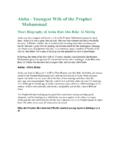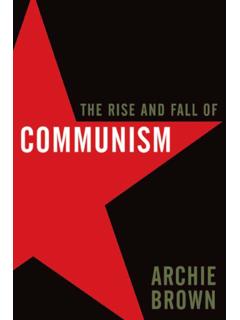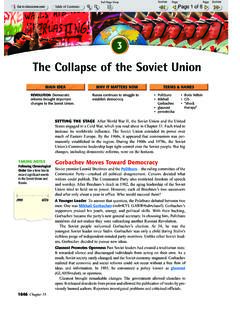Transcription of Jesus, Interrupted : Revealing the Hidden …
1 jesus , Interrupted Revealing the Hidden Contradictions in the Bible (and Why We Don t Know About Them) Bart D. Ehrman To Aiya, granddaughter extraordinaire Contents Prefacev one A Historical Assault on Faith 1 two A World of Contradictions 19 three A Mass of Variant Views 61 four Who Wrote the Bible? 101 five Liar, Lunatic, or Lord? Finding the Historical jesus 139 six How We Got the Bible 181 seven Who Invented Christian ity? 225 eight Is Faith Possible? 269 Notes 285 About the Author Other Books by Bart D.
2 Ehrman Credits Cover Copyright About the PublisherPreface Iarrived at Princeton Theological Seminary in August 1978, fresh out of college and recently married. I had a well-thumbed Greek New Testament, a passion for knowledge, and not much else. I had not always been passionate about learning. No one who knew me fi ve or six years earlier would ever have predicted that I d be headed for a career in academia. But I had been bitten by the academic bug some-where along the way in college. I suppose it was fi rst at the Moody Bible Institute, in Chicago, a fundamentalist Bible college I started attending at the ripe young age of seventeen.
3 There my academic drive was fueled not by intellectual curiosity so much as by a reli-gious desire for certainty. Studying at Moody was an intense experience for me. I had gone there because I had had a born-again experience in high school and decided that to be a serious Christian I would need serious training in the Bible. And somehow, during my first semester in college, something happened to me: I became passionate fi erce, even in my quest for knowledge about the Bible. At Moody not only did I take every Bible and theology course that I could, but on my own I also memorized entire books of the Bible by rote.
4 I studied during every free moment. I read books and mastered lecture notes. Just about every week I pulled an all-nighter, preparing for classes. vi Preface Three years of that will change a person s life. It will certainly toughen up one s mind. When I graduated from Moody I headed off to Wheaton College to get a degree in English literature, but I kept up my intense focus on the Bible, taking interpretation courses and teaching the Bible every week to kids in my youth group at church. And I learned Greek so that I could study the New Testament in its original language.
5 As a committed Bible-believing Christian I was certain that the Bible, down to its very words, had been inspired by God. Maybe that s what drove my intense study. These were God s words, the communications of the Creator of the universe and Lord of all, spoken to us, mere mortals. Surely knowing them intimately was the most important thing in life. At least it was for me. Understand-ing literature more broadly would help me understand this piece of literature in particular (hence my major in English literature); being able to read it in Greek helped me know the actual words given by the Author of the text.
6 I had decided already in the course of my freshman year at Moody that I wanted to become a professor of the Bible. Then, at Wheaton, I realized that I was pretty good at Greek. And so my next step was virtually chosen for me: I would do a doctorate in New Testament studies, and work especially on some aspect of the Greek language. My beloved professor of Greek at Wheaton, Gerald Hawthorne, in-troduced me to the work of Bruce Metzger, the most revered scholar of Greek biblical manuscripts in the country, who happened to teach at Princeton Theological Seminary.
7 And so I applied to Princeton, knowing nothing absolutely nothing about it, except that Bruce Metzger taught there and that if I wanted to become an expert in Greek manuscripts, Princeton was where I needed to go. I guess I did know one thing about Princeton Seminary: it was not an evangelical institution. And the more I learned about it in the months leading up to my move to New Jersey, the more nervous I became. I learned from friends that Princeton was a liberal seminary where they did not hold to the literal truth and verbal Preface vii inspiration of the Bible.
8 My biggest challenge would not be purely academic, doing well enough in my master s-level classes to earn the right to go on to do a It would be holding on to my faith in the Bible as the inspired and inerrant Word of God. And so I came to Princeton Theological Seminary young and poor but passionate, and armed to take on all those liberals with their watered-down view of the Bible. As a good evangelical Christian I was ready to fend off any attacks on my biblical faith. I could answer any apparent contradiction and resolve any potential discrepancy in the Word of God, whether in the Old or New Testament.
9 I knew I had a lot to learn, but I was not about to learn that my sacred text had any mistakes in it. Some things don t go as planned. What I actually did learn at Princeton led me to change my mind about the Bible. I did not change my mind willingly I went down kicking and screaming. I prayed (lots) about it, I wrestled (strenuously) with it, I resisted it with all my might. But at the same time I thought that if I was truly committed to God, I also had to be fully committed to the truth.
10 And it became clear to me over a long period of time that my former views of the Bible as the inerrant revelation from God were flat-out wrong. My choice was either to hold on to views that I had come to realize were in error or to follow where I believed the truth was leading me. In the end, it was no choice. If something was true, it was true; if not, not. I ve known people over the years who have said, If my beliefs are at odds with the facts, so much the worse for the facts. I ve never been one of these people. In the chapters that follow I try to explain why scholarship on the Bible forced me to change my views.



